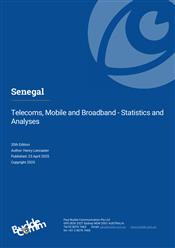Senegal Telecoms Market Report
Telecoms, Mobile and Broadband - Statistics and Analyses

Last updated: 19 Jan 2024 Update History
Report Status: Current
Report Pages: 169
Analyst: Henry Lancaster
Free Senegal joins Sonatel in acquiring 5G spectrum
Senegal’s telecom market continues to show steady growth in all sectors. This has been supported by the government’s ambitions to develop a digital transformation of the economy using ICTs and wider access to internet connectivity. The mobile subscriber base increased 7.9% in the year to September 2023, while the number of fixed broadband subscribers (DSL and fibre) increased 45.6%. In common with most markets in the region, mobile internet platforms account for the vast majority of all internet accesses. Quality of Service issues continue to plague the market, with the regulator periodically issuing fines to the market players.
Orange Group’s local subsidiary Orange Senegal (Sonatel) remains the dominant player in both the fixed-line and mobile sectors, where its share of subscribers has been relatively stable for several years. Free Senegal and Expresso Telecom provide effective competition, while Promobile has emerged as a new operator which has rapidly gained market share since 2021. Both Sonatel and Free have secured spectrum for 5G use, and the launch of 5G services fits in with the government’s Digital Senegal 2025 initiative.
Key developments:
- Orange Senegal and Free Senegal launch 5G after securing spectrum in the 3.5GHz band.
- Axian Telecom increases its stake in Free Senegal to 80%.
- Senegal’s internet services remain susceptible to government censorship.
- Government allocates $188 million to the Ministry of Digital Economy and Telecommunications to improve the economy’s digital transformation.
- Digital Senegal 2025 program makes progress.
- Report update includes the regulator's market data to September 2023, operator data to Q3 2023, updated Telecom Maturity Index charts and analyses, recent market developments.
Companies mentioned in this report:
Sonatel (Orange Senegal), Free Senegal (Sentel, Tigo Senegal), Saga Africa Holdings, Sudatel (Expresso), Arc Informatique, Globacom, Mainstreet Technologies, Lycamobile Senegal
Related Reports
- Africa - Fixed Broadband Market - Statistics and Analyses
- Africa - Mobile Infrastructure and Mobile Broadband
- Africa - Mobile Network Operators and MVNOs
- South Africa - Telecoms, Mobile and Broadband - Statistics and Analyses
- Zambia - Telecoms, Mobile and Broadband - Statistics and Analyses
- Rwanda - Telecoms, Mobile and Broadband - Statistics and Analyses
- Uganda - Telecoms, Mobile and Broadband - Statistics and Analyses
- Egypt - Telecoms, Mobile and Broadband - Statistics and Analyses
- Cameroon - Telecoms, Mobile and Broadband - Statistics and Analyses
- Kenya - Telecoms, Mobile and Broadband - Statistics and Analyses
Share this Report
TMT Intelligence
A platform to scale your intelligence tasks
Monitor critical insights with our AI-powered Market Intelligence Platform gathering and analyzing intelligence in real time. With AI trained to spot emerging trends and detect new strategic opportunities, our clients use TMT Intelligence to accelerate their growth.
If you want to know more about it, please see:
Research Methodology
BuddeComm's strategic business reports contain a combination of both primary and secondary research statistics, analyses written by our senior analysts supported by a network of experts, industry contacts and researchers from around the world as well as our own scenario forecasts.
For more details, please see:
More than 4,000 customers from 140 countries utilise BuddeComm Research
Are you interested in BuddeComm's Custom Research Service?
Hot Topics
News & Views
Have the latest telecommunications industry news delivered to your inbox by subscribing to BuddeComm's weekly newsletter.